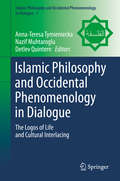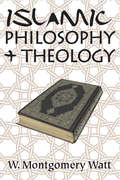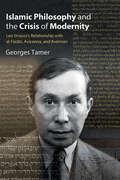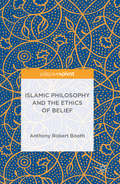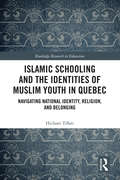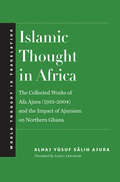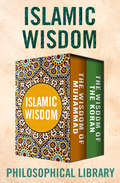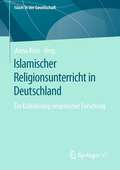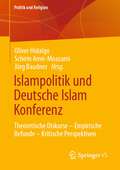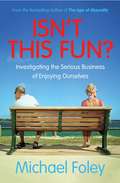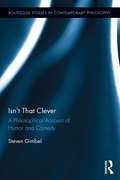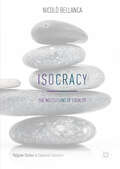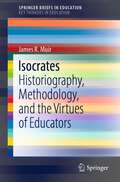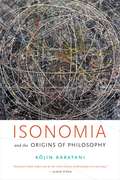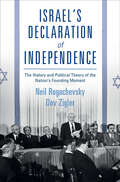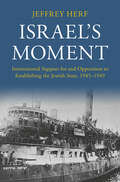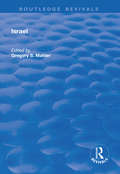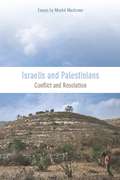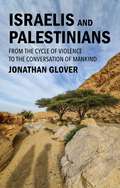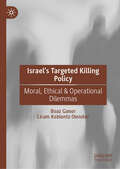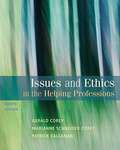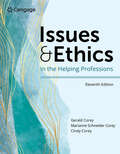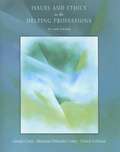- Table View
- List View
Islamic Philosophy and Occidental Phenomenology in Dialogue
by Anna-Teresa Tymieniecka Nazif Muhtaroglu Detlev QuinternThe contributions, composed in this volume, are inspired not only by the necessity but also by the potentialities of a process which continues and deepens cross-cultural understanding, especially between Islamic and Western philosophy. Following the tradition of an East-Western symphony of thoughts, the authors focus on common horizons and while applying comparative and historical approaches, varieties of unity appear on the ways towards a New Enlightenment. The creative force, orchestrating the harmony in the web of Life, communicates in the mean time with the capacities of human beings, advancing in deciphering its micro-macrocosmic dimensions. Here, the encounter of the Logos of Life Philosophy (A-T. Tymieniecka) and Islamic Philosophy open the space for constructive disputation. In the wake of the crisis of postmodern unknowability, paths towards a new critique of reason go hand in hand with fundamental issues, being reflected newly.
Islamic Philosophy and Theology: An Extended Survey (The\new Edinburgh Islamic Surveys Ser.)
by W. Montgomery WattEvents are making clear to ever-widening circles of readers the need for something more than a superficial knowledge of non-European cultures. In particular, the blossoming into independence of numerous African states, many of which are largely Muslim or have a Muslim head of state, has made clear the growing political importance of the Islamic world, and, as a result, the desirability of extending and deepening the understanding and appreciation of this great segment of mankind. Islamic philosophy and theology are looked at together in a chronological framework in this volume. From a modern standpoint, this juxtaposition of the two disciplines is important for the understanding of both; but it should be realized at the outset that it is a reversal of the traditional Islamic procedure. Not merely were the disciplines different, but in the earlier centuries the exponents were two different sets of persons, trained in two different educational traditions, each with its own separate institutions. There was little personal contact between philosophers and theologians, and the influence of the two disciplines on one another was largely by way of polemics. Eventually while philosophy died out as a separate discipline in the Islamic world, many parts of it were incorporated in theology. This work is designed to give the educated reader something more than can be found in the usual popular books. The work undertakes to survey a special part of the field, and to show the present stage of scholarship. Where there is a clear picture this will be given; but where there are gaps, obscurities and differences of opinion, these will also be indicated. This work is brilliant in its design, style, and intimate understanding. It is a must read for specialists and policy makers alike.
Islamic Philosophy and the Crisis of Modernity: Leo Strauss's Relationship with al-Fārābī, Avicenna, and Averroes (SUNY series in the Thought and Legacy of Leo Strauss)
by Georges TamerThis study examines the impact of the medieval Muslim philosophers al-Fārābī, Ibn Sīnā (Avicenna) and Ibn Rushd (Averroes) on Leo Strauss. Through meticulous source analysis, Georges Tamer critically evaluates Strauss's interpretation of their works. Furthermore, he explores how Islamic philosophy shaped Strauss's understanding of Maimonides and Plato, providing a compelling solution to the modernity crisis he identified. Offering fresh perspectives on the evolution of Strauss's thought and his distinctive approach to Arabic sources, Tamer sheds light on the pivotal role of al-Fārābī, the most significant Muslim philosopher in Strauss's view, including key aspects of al-Fārābī's political philosophy and his nuanced take on Plato's ideas. Islamic Philosophy and the Crisis of Modernity is a valuable addition to current scholarship on Strauss. Both philosophically erudite and philologically rigorous, Tamer presents the reader with a balanced perspective on Strauss's insights without being overly reverential or dismissive.
Islamic Philosophy and the Ethics of Belief
by Anthony Robert BoothIn this bookthe author argues that the Falasifa,the Philosophers of the Islamic Golden Age, are usefully interpreted throughthe prism of the contemporary, western ethics of belief. He contends that theirposition amounts to what he calls 'Moderate Evidentialism' - that only for theepistemic elite what one ought to believe is determined by one's evidence. Theauthor makes the case that the Falasifa's position is well argued, ingeniouslycircumvents issues in the epistemology of testimony, and is well worth takingseriously in the contemporary debate. He reasons that this is especially thecase since the position has salutary consequences for how to respond tothe sceptic, and for how we are to conceive of extremist belief.
Islamic Populism in Indonesia and the Middle East
by Vedi R. HadizIn a novel approach to the field of Islamic politics, this provocative new study compares the evolution of Islamic populism in Indonesia, the country with the largest Muslim population in the world, to the Middle East. Utilising approaches from historical sociology and political economy, Vedi R. Hadiz argues that competing strands of Islamic politics can be understood as the product of contemporary struggles over power, material resources and the result of conflict across a variety of social and historical contexts. Drawing from detailed case studies across the Middle East and Southeast Asia, the book engages with broader theoretical questions about political change in the context of socio-economic transformations and presents an innovative, comparative framework to shed new light on the diverse trajectories of Islamic politics in the modern world.
Islamic Schooling and the Identities of Muslim Youth in Quebec: Navigating National Identity, Religion, and Belonging (Routledge Research in Education)
by Hicham TiflatiThis insightful text examines the impact of Islamic schooling on Muslim youth in French-speaking Canada to consider how these institutions influence the formation of students’ cultural, national, ethnic, and religious identities, and their sense of belonging to Quebec and Canada. Through close qualitative analysis of interviews conducted with first- and second-generation students, as well as parents, teachers, and leaders involved in Islamic high schools, this text explores how far institutions succeed in preparing young Muslims to participate in the broader secular society in Quebec and in English-speaking Canada. As well as investigating the historical and contemporary development of Islamic schooling in Canada, and addressing public perceptions of this educational sector, the volume foregrounds the voices of those directly involved in these schools to illustrate first-hand experiences, and the motivations and objectives of those choosing to support or engage in these schools. Overarching themes include citizenship, integration, and the complex interplay of Muslim, Quebecois, and Canadian values. This book will be of great interest to graduate and postgraduate students, researcher scholars and academics in the fields of religion, education, Islamic studies, multicultural education curriculum studies, and faith-based teacher education.
Islamic Thought in Africa: The Collected Works of Afa Ajura (1910-2004) and the Impact of Ajuraism on Northern Ghana (World Thought in Translation)
by Alhaj Yusuf Ajura Zakyi IbrahimThe first book length-work on Afa Ajura and translation of his complete poems This is the first English translation of and commentary on the collected poems of Alhaj YŠ«suf á¹¢Ä?liḥ Ajura (1910–2004), a northern Ghanaian orthodox Islamic scholar, poet, and polemicist known as Afa Ajura, or “scholar from Ejura.” The poems, all handwritten in Arabic script, mainly in the Ghanaian language of Dagbani and also Arabic, explore the author’s socio†‘religious beliefs. In the accompanying introduction, the translator examines the diverse themes of the poems and how they challenge TijÄ?niyyah Sufi clerics and traditional practices such as idol worship.
Islamic Wisdom: The Wisdom of Muhammad and The Wisdom of the Koran (Wisdom)
by Philosophical LibraryAn inspirational anthology that draws on sacred texts to provide essential insight into Islam, one of the world&’s great religions.The Wisdom of Muhammad: This compelling examination of the life and sayings of Muhammad offers the modern reader a guide to the history and principles of the world&’s second largest religion. Covering a diverse range of topics, from marriage and civic charity to the individual&’s relationship to God and the afterlife, the Prophet&’s words dispel misconceptions about Islam and its teachings. The Wisdom of the Koran: Representing the ultimate authority on almost every issue in Muslim life, the Koran&’s lessons and parables offer moral and spiritual guidance to the faithful. In this essential guide, readers learn about key chapters such as &“The Night Journey&” and &“The Cave&” as well as several stories from Judeo-Christian history.
Islamischer Religionsunterricht in Deutschland: Ein Kaleidoskop empirischer Forschung (Islam in der Gesellschaft)
by Anna KörsDas Buch gibt einen breiten und interdisziplinären Überblick zur empirischen Forschung über den islamischen Religionsunterricht in Deutschland zehn Jahre nach Einführung der Islamischen Theologie an deutschen Universitäten und der Ausbildung von islamischen Religionslehrkräften für den schulischen Religionsunterricht. Damit bietet es einen kaleidoskopischen Blick auf die Vielfalt und unterschiedlichen Facetten vorliegender empirischer Erkenntnisse aus Theologie, Religionspädagogik, Islamwissenschaft, Erziehungswissenschaft, Soziologie und verweist zugleich auf zukünftige Forschungsperspektiven und -bedarfe des noch jungen und dynamischen Forschungsfeldes.
Islampolitik und Deutsche Islam Konferenz: Theoretische Diskurse – Empirische Befunde – Kritische Perspektiven (Politik und Religion)
by Oliver Hidalgo Schirin Amir-Moazami Jörg BaudnerDer Band versammelt Beiträge ausgewiesener Expert*innen zu den verfassungsrechtlichen Rahmenbedingungen, theoretischen Potenzialen und politischen Regulierungen der Islampolitik in der säkularen Demokratie in Deutschland. Vor allem am Präzedenzfall und zentralen Beispiel der seit 2006 eingerichteten Deutschen Islam Konferenz werden die Chancen und Risiken, Problemkreise und Dilemmata der deutschen Islampolitik aufgezeigt sowie die bislang gefundenen Dialog- und Kooperationsformen zwischen dem deutschen Staat und den hierzulande lebenden Muslim*innen kritisch analysiert. Die Beiträge reflektieren im Einzelnen die nach wie vor vorhandenen Defizite in der Gleichbehandlung von muslimischen und nicht-muslimischen Religionsgemeinschaften, die unterschiedlichen Interessen und Missverständnisse zwischen den beteiligten Akteur*innen der DIK sowie künftige Möglichkeiten und Hürden für eine Diskurs auf Augenhöhe. Sie thematisieren dabei außerdem die Frage, inwieweit der deutsche Staat in der Behandlung der Muslim*innen seine religionspolitischen Kompetenzen bislang ausschöpft oder überschreitet.
Isn't This Fun?: Investigating the Serious Business of Enjoying Ourselves
by Michael FoleyMichael Foley wants to understand why he doesn't appear to be experiencing as much 'fun' as everyone else. So, with characteristic wit and humour, he sets out to understand what fun really means, examining its heritage, its cultural significance and the various activities we associate with fun. He investigates pursuits such as dancing, sex, holidays, sport, gaming, and comedy, and concludes that fun is not easy, simple and fixed, as many seem to believe, but elusive, complex and constantly changing. In fact, fun is a profoundly serious business, a range of new group rituals evolving in response to cultural developments, often motivated as much by spirituality as hedonism. Also, while fun is a modern phenomenon it turns out to have recreated many of the elements of early ritual. His findings will invigorate you with insights, make you laugh at life, and quite possibly help you to understand why the post-post-modern is actually the pre-pre-modern.
Isn't This Fun?: Investigating the Serious Business of Enjoying Ourselves
by Michael FoleyMichael Foley wants to understand why he doesn't appear to be experiencing as much 'fun' as everyone else. So, with characteristic wit and humour, he sets out to understand what fun really means, examining its heritage, its cultural significance and the various activities we associate with fun. He investigates pursuits such as dancing, sex, holidays, sport, gaming, and comedy, and concludes that fun is not easy, simple and fixed, as many seem to believe, but elusive, complex and constantly changing. In fact, fun is a profoundly serious business, a range of new group rituals evolving in response to cultural developments, often motivated as much by spirituality as hedonism. Also, while fun is a modern phenomenon it turns out to have recreated many of the elements of early ritual. His findings will invigorate you with insights, make you laugh at life, and quite possibly help you to understand why the post-post-modern is actually the pre-pre-modern.
Isn’t that Clever: A Philosophical Account of Humor and Comedy (Routledge Studies in Contemporary Philosophy)
by Steven GimbelIsn’t That Clever provides a new account of the nature of humor – the cleverness account – according to which humor is intentional conspicuous acts of playful cleverness. By defining humor in this way, answers can be found to longstanding questions about humor ethics (Are there jokes that are wrong to tell? Are there jokes that can only be told by certain people?) and humor aesthetics (What makes for a good joke? Is humor subjective?). In addition to humor in general, Isn’t That Clever asks questions about comedy as an art form such as whether there are limits to what can be said in dealing with a heckler and how do we determine whether one comedian has stolen jokes from another.
Isocracy: The Institutions of Equality (Palgrave Studies in Classical Liberalism)
by Nicolò BellancaIn the twentieth century there were two great political and social paradigms, the liberal-democratic and the libertarian (in its various socialist, anarchist, and communist delineations). The central idea of the first approach is isonomy: the exclusion of any discrimination on the basis that legal rights are afforded equally to all people. The central idea of the second approach is rather to acknowledge and address a broader spectrum of known inequalities. Such an approach, Bellanca argues, allows the pursuit of pluralism as well as a more realistic and complex view of what equality is. Here he analyzes the main economic and political institutions of an isocratic society, and in so doing, effectively outlines how a utopian society can be structurally and anthropologically realized.This book is ideal reading for an audience interested in the critique of contemporary capitalism through a renewed perspective of democratic socialism and leftist libertarianism. Nicolò Bellanca is Associate Professor of Development Economics at the University of Florence, Italy. He is the author of a broad array of scholarly articles, books and textbooks about both the history of economic thought and development economics. His current research focuses on the theory of institutional change.
Isocrates: Historiography, Methodology, and the Virtues of Educators (SpringerBriefs in Education)
by James R. MuirIsocrates is one of the most remarkable and influential figures in the history of human thought. The influence of his ideas in the history of historical writing, rhetoric, the visual arts, music, religion and theology, political science, philosophy and, above all, educational philosophy and practice in Europe, Australia, North America, North Africa, and the Middle East are well established and widely known. This book argues careful study of the educational philosophy of Isocrates and its legacy can contribute to an improved understanding of the historiography of educational thought, his distinctive normative methodology in both political and educational philosophy, and his arguments about the primary importance of the virtues of self-knowledge and realistic self-appraisal for educational philosophers and practitioners. At a time when educational philosophy has an increasingly precarious academic existence and educationists are actively seeking new historiographical and methodological approaches to the philosophical study of education, there is much to be gained by recovering and reevaluating the historiography and normative methodology of Isocrates and the role they play in educational discourse and practice today.
Isonomia and the Origins of Philosophy
by Joseph A. Murphy Kojin KarataniIn Isonomia and the Origins of Philosophy—published originally in Japanese and now available in four languages—Kojin Karatani questions the idealization of ancient Athens as the source of philosophy and democracy by placing the origins instead in Ionia, a set of Greek colonies located in present-day Turkey. Contrasting Athenian democracy with Ionian isonomia—a system based on non-rule and a lack of social divisions whereby equality is realized through the freedom to immigrate—Karatani shows how early Greek thinkers from Heraclitus to Pythagoras were inseparably linked to the isonomia of their Ionian origins, not democracy. He finds in isonomia a model for how an egalitarian society not driven by class antagonism might be put into practice, and resituates Socrates's work and that of his intellectual heirs as the last philosophical attempts to practice isonomia's utopic potentials. Karatani subtly interrogates the democratic commitments of Western philosophy from within and argues that the key to transcending their contradictions lies not in Athenian democracy, with its echoes of imperialism, slavery, and exclusion, but in the openness of isonomia.
Israel's Declaration of Independence: The History and Political Theory of the Nation's Founding Moment
by Neil Rogachevsky Dov ZiglerIsrael's Declaration of Independence brings to life the debates and decisions at the founding of the state of Israel. Through a presentation of the drafts of Israel's Declaration of Independence in English for the first time, Neil Rogachevsky and Dov Zigler shed new light on the dilemmas of politics, diplomacy, and values faced by Israel's leaders as they charted the path to independence and composed what became modern Israel's most important political text. The stakes began with war, state-building, strategy, and great power politics, and ascended to matters of high principle: freedom, liberty, sovereignty, rights, and religion. Using fast-paced narration of the meetings of Israel's leadership in April and May 1948, this volume tells the astonishing story of the drafting of Israel's Declaration of Independence, enriching and reframing the understanding of Israel's founding and its ideas - and tracing its legacy.
Israel's Moment: International Support for and Opposition to Establishing the Jewish State, 1945–1949
by Jeffrey HerfIsrael's Moment is a major new account of how a Jewish state came to be forged in the shadow of World War Two and the Holocaust and the onset of the Cold War. Drawing on new research in government, public and private archives, Jeffrey Herf exposes the political realities that underpinned support for and opposition to Zionist aspirations in Palestine. In an unprecedented international account, he explores the role of the United States, the Arab States, the Palestine Arabs, the Zionists, and key European governments from Britain and France to the Soviet Union, Czechoslovakia and Poland. His findings reveal a spectrum of support and opposition that stood in sharp contrast to the political coordinates that emerged during the Cold War, shedding new light on how and why the state of Israel was established in 1948 and challenging conventional associations of left and right, imperialism and anti-imperialism, and racism and anti-racism.
Israel: Development And Conflict (The\international Library Of Politics And Comparative Government)
by Gregory S. MahlerThis title was first published in 2000: The International Library of Politics and Comparative Government brings together in one series, the most significant journal articles to appear in the field of comparative politics in the last twenty-five years. It makes accessible to teachers, researchers and students an extensive range of essays which provide an indispensable basis for understanding both the established conceptual terrain and the new ground being broken in the fast changing field of comparative political analysis. A number of acknowledged experts have been invited to act as editors for the series. They preface each volume with an introductory essay in which they review the basis for the selection of articles and suggest future directions of research and investigation in the subject area. An invaluable resource for all those working in the field of comparative government and politics.
Israelis and Palestinians
by Moshé MachoverThese essays, written between 1966 and 2010 by lifelong Israeli activist and theorist Moshé Machover, cover diverse aspects of Israeli society and the Israeli-Palestinian conflict. Elaborating on the ideas of the Socialist Organization in Israel (Matzpen), two interrelated themes appear throughout the collection: the necessity of understanding the Israeli-Palestinian conflict in a regional context and the connection between Palestinian liberation and the struggle for socialism throughout the Middle East.
Israelis and Palestinians: From the Cycle of Violence to the Conversation of Mankind
by Jonathan GloverCan Israelis and Palestinians end their long conflict? The shocking violence of current events undermines hope, as does the long history of peace deals sabotaged by extremists on both sides. In this compelling and timely book, the eminent moral philosopher Jonathan Glover argues that one vital step towards progress is to better understand the disturbing psychology of the cycle of violence. Glover explores the psychological flaws that entrap both sides: the urge to respond to wounds or humiliation with backlash; political or religious beliefs held with a rigidity that excludes compromise; and people’s identity being shaped by the conflict in ways that make it harder to imagine or even desire alternatives. Drawing on the history of comparable conflicts that eased over time, Glover proposes some ways to gradually weaken the grip of this psychology. Completed as casualties mounted in the latest political and humanitarian crisis, Israelis and Palestinians is essential reading for anyone concerned by the ongoing violence in the Middle East.
Israel’s Targeted Killing Policy: Moral, Ethical & Operational Dilemmas
by Boaz Ganor Liram Koblentz-StenzlerThe book explores the main moral, ethical and operational dilemmas of targeted killings from an Israeli perspective. Even though many countries contending with terrorism have adopted this tool (either overtly or covertly) within the arsenal used in implementing their counter-terrorism policies, it seems that Israel, as one of the world's leading practitioner of targeted killing in its counter-terrorism effort, constitutes the most appropriate case study for reviewing implications and dilemmas associated with this practice. Each chapter will present a different ethical–moral–operational dilemma emanating from a deployment of a targeted killing. The analysis of Israeli considerations and solutions to these dilemmas is built around interviews with Israeli decision-makers, former senior security officials and other experts. The chapters also cover public opinion polls in order to highlight the views of the Israeli public vis-a-vis each dilemma. Finally, chapters will conclude with lessons learned and offer recommendations for a practical and moral solution. The final chapter then draws together universal conclusions and recommendations for the use of targeted killings.
Issues And Ethics In The Helping Professions
by Gerald Corey Patrick Callanan Marianne CoreyAimed at both undergraduate and graduate students in the helping professions, this textbook addresses various ethical, legal, and professional issues they will encounter in their future careers. Each chapter begins with a self-inventory, and open-ended cases and situations are presented throughout to stimulate thought and discussion. Topics include (for example) the management of boundaries; the incorporation of spiritual and religious values; and the fulfillment of record keeping responsibilities.
Issues and Ethics in the Helping Professions
by Gerald Corey Marianne Schneider Corey Cindy CoreyReflecting the latest researching, thinking and trends in practice, Corey/Corey/Corey's ISSUES AND ETHICS IN THE HELPING PROFESSIONS, 11th Edition, teaches the process for thinking about and resolving the basic issues counselors with face throughout their career, making it ideal for students and professionals alike. The authors share their personal views as well as challenge students to develop their own position and guidelines within the broad limits of professional codes of ethics and divergent theoretical positions. Offering a wide range of perspectives, about 40 respected leaders in the counseling profession also share their positions through the new Voices From the Field feature.
Issues and Ethics in the Helping Professions (7th Edition)
by Gerald Corey Marianne Schneider Corey Patrick CallananUp-to-date and comprehensive, this practical best-selling text now available with an online personalized study plan, helps students learn how to deal with and apply ethical standards. The authors provide readers with the basis for discovering their own guidelines within the broad limits of professional codes of ethics and divergent theoretical positions. They raise what they consider to be central issues, present a range of diverse views on these issues, discuss their position, and provide readers with many opportunities to refine their own thinking and to actively develop their own position. The authors explore such questions as: What role do the therapist's personal values play in the counseling relationship? What ethical responsibilities and rights do clients and therapists have? And, what considerations are involved in adapting counseling practice to diverse client populations?
